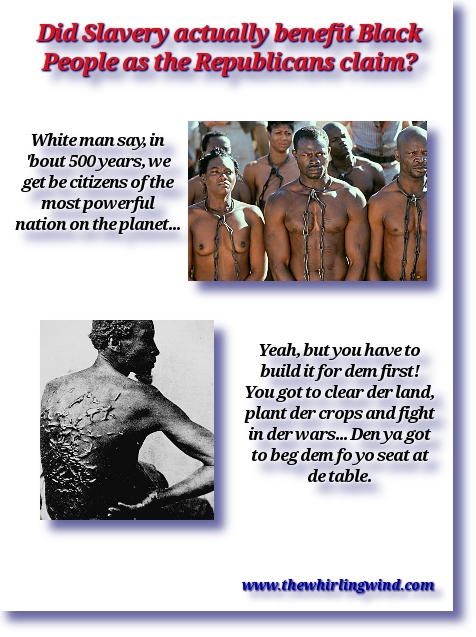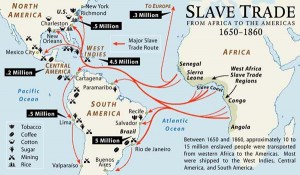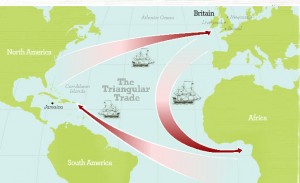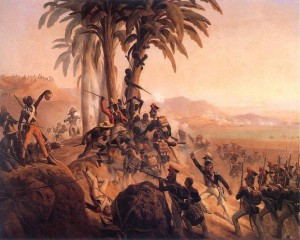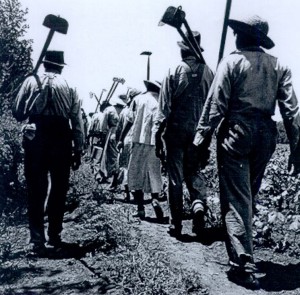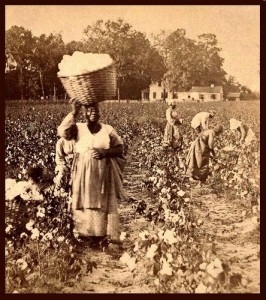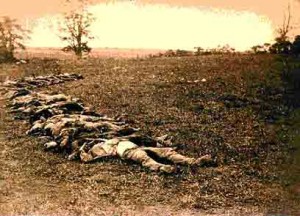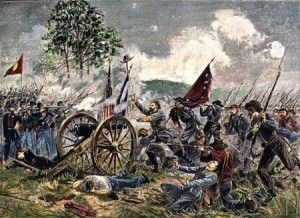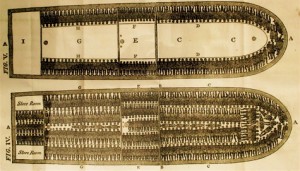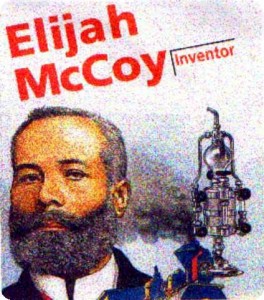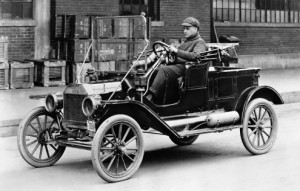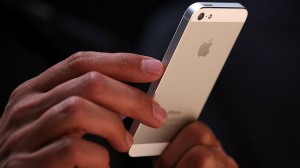by Benjamin T. Moore, Jr.
Did Slavery actually benefit Black People? This silly narrative resurfaces from time to time, promoted by racist white people whom ironically enough, never seem to say this in the presence of Black people unless they’ve got security and strength in numbers close at hand. Presupposing this notion indicates not only an ingrained sociopathic racism, it reveals a paucity of historical knowledge and American history in particular. One might just as easily – in the spirit of a free exchange of ideas of course – ask if the Jewish Holocaust benefited the Jews? After all, they got the “Nation of Israel” out of the deal?
A beginning is a very delicate time… well, not really!
As with most atrocities in human history, this one too began with religion… the Catholic Church in particular.
“We grant you [Kings of Spain and Portugal] by these present documents, with our Apostolic Authority, full and free permission to invade, search out, capture, and subjugate the Saracens and pagans and any other unbelievers and enemies of Christ wherever they may be, as well as their kingdoms, duchies, counties, principalities, and other property […] and to reduce their persons into perpetual slavery.” __Papal Bull from Pope Nicholas V in 1452 known as the Dum Diversas
What the “Dum Diversas” did was usher in a new type of slavery. A type of slavery which had never before been seen in recorded human history. Chattel Slavery. Prior to this, Slaves had rights, they could own property, they could acquire skills or a trade, they knew the date of their release because slavery was not in perpetuity. They could even buy their freedom early if they were talented.
Under the aegis of the “Dum Diversas” once enslaved you were a slave for the rest of your life. You could never again own property. If you were born to parents who were enslaved, you were a slave merely by accident of birth. You were born without a future. Did slavery benefit Black people? Do you think being born into Slavery was a benefit?
One of the attendant myths is that most of the Slaves were sold to the slave traders by other Africans. Did any of this happen? To be sure, it did happen on occasion. However, when you look at the sheer numbers, it becomes immediately clear that the percentage of Slaves captured in battle and sold by other Africans becomes insignificant.
The enslavement of Africans was a booming business. As with all businesses, records were maintained. Profit and loss statements. From capture to being sold at auction was called “The Middle Passage.” During the 400+ years that Slavery was practiced in the Americas, by conservative estimates, over 100 million Africans lost their lives. These were Africans who never made it to the auction blocks to live out the rest of their lives under the misery and degradation of Slavery. Africans were considered expendable and replaceable.
The other thing to understand is, what became The “United States of America,” received no more than 4% of the Slaves. The bulk of the Slaves went to South America, the West Indies and a few went to Europe. The lions share of the Slaves went to the West Indies. Why? In a word, “Rum.” Slaves were brought in to work the sugar cane plantations. The sugar was used to make Rum. The Rum was sold back in Europe and in the United States. The drug of choice was alcohol in the form of Rum and just as with Cocaine today, the cost in human misery was staggering. Did Slavery benefit Black people? A lot of white people certainly got rich selling the Rum.
It was quite common for the slaves working the island sugar cane plantations to simply be worked literally to death. As far as they were concerned, they had an endless supply. No doubt it was the excessively harsh conditions that lead to the Slave revolts and uprisings that eventually led to the liberation which never occurred here. The Slaves in the islands had no choice. They were dead either way.
Slavery in these United States
Had it not been for the Haitian Revolution, the Louisiana Purchase never would have happened. France needed the money to put down the Slaves who’d had enough in Haiti. Thus Napoleon made a deal with Jefferson which amounted to a little less than 3 cents an acre. The Louisiana Purchase solidified what was then only the seed of a notion. It was a concept that came to be known as “Manifest Destiny.”
Ask yourself, how did a budding set of colonies, leap forward, catch and surpass the much more mature and established industries of Europe? The simple answer is all the free labor provided by Slaves. The largest cost when it comes to expansion is in building your infrastructure. Your next concern is logistics. How do you supply “civilization” to those people who expand into newly opened territories? They will need food to get started, they will need axe heads, shovels, plows, saws, nails, hammers and a host of other things we rarely consider and take for granted.
The only reason the South was so ready to secede from the Union was, because they made heavy use of slave labor. They could always undercut European prices on quality textiles. Because of fear and the mechanisms of oppression and control, Slaves were denied access to educational opportunities. Thus, it was more difficult to make full use of them in the industrialized Northern States. The products of industry created in the North could not compete price wise with the older more mature industrial production in Europe.
People forget that the entire reason for the Civil War had to do with trade tariffs. In order to protect the fledgling manufacturing industries from the predatory trade practices of Europe, the Government of the United States placed tariffs on incoming European industrial products. This levelled the playing field for American manufacturers. Europe in kind did the same thing which affected the price on textiles they were importing from our Southern States. Quite naturally this cut into the profit margins – which were already way out of line due to free labor – of the plantation owners and they went through the roof.
The reason they voted to secede was because they believed that they could then negotiate their old profit margins by claiming to no longer be part of these United States. The North disputed and that disagreement led to the Civil War. As the war went on and the body count rose, it became apparent to Abraham Lincoln and others, that the South could continue to fight – logistics – so long as they had a free labor source at home tending their fields, growing their crops and producing the goods and services they needed for their war efforts.
If you actually read the “Emancipation Proclamation,” you will note that it only applied to the Slaves in the rebellious Southern States. If you were a Slave in the North, it did not apply to you. Thus the notion that Abraham Lincoln freed the Slaves is specious on it’s face. His “Proclamation” applied to States he did not control.
Did Slavery Benefit Black People?
One of the common arguments of racist is to compare the standard of living and the lifestyle of African Americans with people in various nations on the African continent. To be sure there is a remarkable difference. However, we need to examine some facts. In 1492 the entire European population was estimated to be at 60 million. Compare this figure to the 100 million Africans who lost their lives during the 400+ years the Atlantic Slave Trade was in business. There were more Africans murdered – never made it into enslavement – than the entire population of Europe. When you add to this slaughter, the number of Africans who actually were sold into Slavery, what we’re really talking about is an African genocide. This was the largest holocaust in recorded human history.
There is really only one true resource on this planet. It is the “Human Resource.” All the solutions to all our problems ultimately come from the human mind. They are applied through human ingenuity. Every white person who has ever lived in these United States, traces their ancestry back to Europe. You no doubt are familiar with the old time machine paradox? “Could you go back in time and murdered your grandfather before he met your grandmother?” The point acknowledges that if your grandparents never got together, you wouldn’t exist.
Keep this concept in mind when you’re looking at the African Holocaust. There were entire branches of the human family that were extinguished. Some of those minds that were aborted generations before they had the opportunity to be born, may have held the cure to death and ageing. They may have held the solution to a faster than light drive which would make interstellar and intergalactic exploration possible. They may have invented new forms of abundant, efficient clean energy. These marvels are not to be… or if they come may come too late.
Even with the racial discrimination that Black people – descendants of Africa – have faced here in America, their contributions have helped to make American society the society we enjoy today.
A few inventions by Black Inventors:
- air conditioning unit Frederick M. Jones July 12, 1949
- almanac Benjamin Banneker Approx 1791
- auto cut-off switch Granville T. Woods January 1, 1839
- auto fishing device G. Cook May 30, 1899
- automatic gear shift Richard Spikes February 28, 1932
- baby buggy W.H. Richardson June 18, 1899
- bicycle frame L.R. Johnson October 10, 1899
- biscuit cutter A.P. Ashbourne November 30, 1875
- blood plasma bag Charles Drew Approx. 1945
- cellular phone Henry T. Sampson July 6, 1971
- chamber commode T. Elkins January 3, 1897
- clothes dryer G. T. Sampson June 6, 1862
- curtain rod S. R. Scratton November 30, 1889
- curtain rod support William S. Grant August 4, 1896
- door knob O. Dorsey December 10, 1878
- door stop O. Dorsey December 10, 1878
- dust pan Lawrence P. Ray August 3, 1897
- egg beater Willie Johnson February 5, 1884
- electric lampbulb Lewis Latimer March 21, 1882
- elevator Alexander Miles October 11, 1867
- eye protector P. Johnson November 2, 1880
- fire escape ladder J. W. Winters May 7, 1878
- fire extinguisher T. Marshall October 26, 1872
- folding bed L. C. Bailey July 18, 1899
- folding chair Brody & Surgwar June 11, 1889
- fountain pen W. B. Purvis January 7, 1890
- furniture caster O. A. Fisher 1878
- gas mask Garrett Morgan October 13, 1914
- golf tee T. Grant December 12, 1899
- guitar Robert F. Flemming, Jr. March 3, 1886
- hair brush Lydia O. Newman November 15, 18–
- hand stamp Walter B. Purvis February 27 1883
- horse shoe J. Ricks March 30, 1885
- ice cream scooper A. L. Cralle February 2, 1897
- improv. sugar making Norbet Rillieux December 10, 1846
- insect-destroyer gun A. C. Richard February 28, 1899
- ironing board Sarah Boone December 30, 1887
- key chain F. J. Loudin January 9, 1894
- lantern Michael C. Harvey August 19, 1884
- lawn mower L. A. Burr May 19, 1889
- lawn sprinkler J. W. Smith May 4, 1897
- lemon squeezer J. Thomas White December 8, 1893
- lock W. A. Martin July 23, 18–
- lubricating cup Ellijah McCoy November 15, 1895
- lunch pail James Robinson 1887
- mail box Paul L. Downing October 27, 1891
- mop Thomas W. Stewart June 11, 1893
- motor Frederick M. Jones June 27, 1939
- peanut butter George Washington Carver 1896
- pencil sharpener J. L. Love November 23, 1897
- phone transmitter Granville T. Woods December 2, 1884
- record player arm Joseph H. Dickenson January 8, 1819
- refrigerator J. Standard June 14, 1891
- riding saddles W. D. Davis October 6, 1895
- rolling pin John W. Reed 1864
- shampoo headrest C. O. Bailiff October 11, 1898
- spark plug Edmond Berger February 2, 1839
- stethoscope Imhotep Ancient Egypt
- stove T. A. Carrington July 25, 1876
- straightening comb Madam C. J. Walker Approx 1905
- street sweeper Charles B. Brooks March 17, 1890
- thermostat control Frederick M. Jones February 23, 1960
- traffic light Garrett Morgan November 20, 1923
- tricycle M. A. Cherry May 6, 1886
- tricycle M. A. Cherry May 6, 1886
Did Slavery benefit Black people? It sure benefited white people. The above list is but a few of the many things invented by Black people that we use every day. You probably are using something invented by a Black person right now. The typewriter for instance is what we call a “foundational invention.” Without the typewriter you wouldn’t have a computer keyboard. The typewriter had to come first.
What if there had been a European Holocaust?
 The further back you prune a branch, the more leaves you remove from the tree. All those secondary and tertiary branches that split off, and the branches that split off from them are removed the closer to the trunk you make your cut.
The further back you prune a branch, the more leaves you remove from the tree. All those secondary and tertiary branches that split off, and the branches that split off from them are removed the closer to the trunk you make your cut.
If an ancestor of Henry Ford had died or Bill Gates and Steve Jobs, they would not exist. Imagine what the world would look like today. If an ancestor of the Wright brothers had been killed, would we have Jet airliners today? Think of some of the people who invented vaccines, or made earth changing discoveries, if their ancestors had been swept up and murdered, what
would the world look like today?
When you look at Africa, you’re looking at a continent that was plundered of it’s most precious of all resources, the human resource. The things that Africans may have created and invented that would have benefited the entire planet have now been lost to racist greed and the capitalism of human bondage. We are paying for this today whether you realize it or not. I have listed but a few of the contributions that the descendants of Africa have made to Western Civilization… if we can call it that. Even so, imagine what contributions they might have made had they been treated equally, and had access to the same educational opportunities as their white counterparts. A mind is truly a terrible thing to waste. Remember this when some racist fool deigns to open his mouth and spew hate speech with a smile. The answer to the question is, “No, Slavery did not benefit Black people. It benefited white people and in the process may have mortally wounded humanity.”

